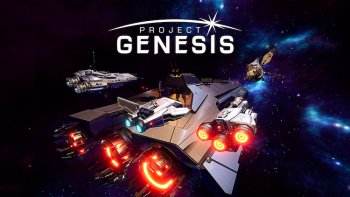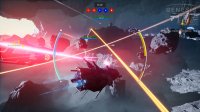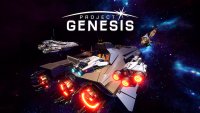A lot has been happening since the last devblog report so this is a big update. Grab some pancakes and have a seat…
Now that the Game Developers Conference and E3 are behind us, the team has shifted out of “Demo Mode” and is back on track into full Production (we’re playing a little bit loose with our development terminology as we still have elements of the game that are in Pre-Production, but for all intents and purposes, we’re excited to start focusing on core features). Here is a quick overview of the things we’ve been working on to date:
- Visual updates galore
- Upgraded movement controls
- Badges and leaderboards
- Steam Store listing
- New “Open Kitchen” Development model
- Infrastructure, optimizations, and refactoring
Visual Effects: Weapons, Shields, and Thrusters
The team has upgraded our visual effects across four important space combat systems: damage states, weapons, shields, and thrusters.

Damage States
To improve the experience of vanquishing your foes, a new damage system has been implemented. This includes adding additional models with stressed elements to indicate what remains after a ship breaks apart. There are also other touches like smoldering metal that add visual flavor and contrast.
Weapons
For weapons, the rail gun, ion repeater, ion disrupter, gatling gun, missiles, flak cannon, and even cluster bombs received a level up in their visual quality. All of these names are currently a placeholder, but we’re using them as descriptors for the time being. Impact visual effects (VFX) for these weapons also received a polish pass.
Shields

Capital ship shields also received a VFX pass. The original shield was really just a semi-transparent mesh that changed color as it took more damage. Now, the system has several visual layers and includes a dynamic local response to indicate to the player where the shield is actually being impacted.

Thrusters
Mark Nicolino built in some basic emissives for the ship engines, which have a great ionic glow for an idle state, but there were no other effects applied to let players know when the ship was cruising or boosting with afterburners.
The community was having difficulty reading when the boosters were firing as the only indication was an energy bar in the HUD. The experience was lackluster and didn’t provide the visceral experience one would expect from powerpacked engines on a weaponized support ship. So we made an effort to improve readability by emphasizing the three different states. We also added some initial kickback in an attempt to really drive home the feeling of high thrust output.
Ship Battle Wear and Tear
Space is a hostile place and space combat ups the ante. The team has implemented the first version of our battle wear system. Mark has taken a pass on wear and tear progression so that a player’s flight and combat hours will cause a gradual degradation of a pristine support ship.

For now, however, players will get a chance to see the most severe form of the battle wear system (minus damage states, which exist but have yet to be included in an external build).
Vessel Movement System
When it comes to controls, Christian has an intuitive sense of how to approach iterating on the feel of gameplay. A competitive FPS and 3rd person combat player, Christian has mentioned that he’s not normally into space games. However, he has given himself the mission of creating a space combat control model that an FPS/3rd person combat player would like to play. This kind of approach is imperative because of the nature of Project Genesis’s breach and board genre mash-up. The transition from 3rd person space combat to FPS on-board firefights can be jarring if not tackled properly.

The movement system is another area where the community has provided great feedback. There are two areas we made changes: inertial momentum and power slide. These changes were made to add flexibility and additional flight control to ship maneuvering. Longer term, these changes set up future design passes to help players in evasion tactics for when they have been locked-on by a fire-and-forget weapon or an especially skilled flight combat opponent.
Inertial Momentum
Inertial momentum loosens up the flight controls to allow for additional angling when turning. We’re transitioning from a more rigid flight control model to let inertia have a greater effect. One of the benefits for this new model is that it provides some relief from getting stuck in the “perpetual circling” that can be quite common in a more arcade-like flight model. This might feel a little uncomfortable at first if you’re used to more responsive controls, but in internal tests, the team adapted to the new model quickly.
Power Slide
The power slide takes inertial momentum a step further. This allows for a more prolonged use of inertial momentum and when coupled with the afterburner boost, really amplifies the ability to juke in quick unpredictable maneuvers.
Badge System
If you like breaking things, consider yourself a competitive gamer, are a content creator, or just want to contribute to our growing community, we are officially starting a badge program to recognize community members who go above and beyond.

We have released a more extensive article recently posted here, but the general upshot is badge holders get the earliest access to insiders builds, and they also get their badges emblazoned on their ships, a badge associated with their name on the leaderboard, and a badge displayed in their player profiles.
If you feel like you’re ready to apply for your candidate status, head on over to our Discord and see what it takes to become a Test Pilot Insider.
Leaderboards
As a part of our infrastructure work on our backend service we thought it would be useful to display in-game progress via leaderboards.

We’re currently only showing kill-count and game wins, but we’ll add more categories in the months ahead as we increase the data we’re tracking on the backend.
While players can expect us to regularly wipe the stats listed, it’s also a good indication of who our Ace Pilots are. As you can see, we’re also showing player badges. If you’re already a Test Pilot, Ace Pilot, Pioneer, or Ambassador you’ll get to show off your status here as well.
Steam Store
We’ve also posted Project Genesis up on the Steam Store so you can follow our development progress there if you’re a part of the Steam community.

Open Kitchen Development
One of the biggest changes is that the team is shifting from a more closed product development approach, focused on polished releases, to specifically timed Project Genesis (very early) pre-alpha update releases. This model of development is sometimes referenced as “open kitchen” development — or Game Development as a Service as outlined by our colleagues on the Subnautica team.
The philosophy behind this style of development emphasizes the engagement and participation of one’s community in the process of game development, while simultaneously offering a clear line of sight into how games are actually made — wrinkles and all. Since most of the 8 Circuit Studios team comes from AAA development this will be a new way of proceeding with development — requiring new systems to give the community a view into Gamedev 101.
Semi-Closed and Insiders’ Playtests
Playtest #1 was “Unnamed” and it was the first official playtest we opened to members of the community to get some important initial feedback on gameplay, as well as test our networking capabilities, and verify our ability to distribute a build externally. It is now known as Playtest .2077.
While our playtests are still selectively allowing participants (ie. semi-closed), Playtest number 2: Andromeda is the team’s opportunity to invite a broader audience to experience Project Genesis first hand. The team is on a mission to offer the opportunity to play Project Genesis with as many people as possible, but the only restriction, for now, is ensuring that the game is as easy as possible for people to pick up and play immediately. Since we don’t yet have a tutorial, or all of the necessary UI to properly provide in-game feedback, we’re keeping the builds to tenacious (and forgiving) players or active community members.
Project Genesis Trello
One of the tools that we use to help us schedule and breakdown work over milestones is Trello. If you’re interested in what features will be coming, this is a great resource for gaining almost real-time insight into build-by-build feature priorities.

You can think of Trello as a more detailed version of a project road map. If you’re interested in what features we’re currently “triaging” (prioritizing, adjusting, and possibly eliminating), keep an eye on our public Trello here.
Automated Build System
Releasing what’s called a “cooked build” requires a major investment of time and technical skill. Releasing these builds to the public has even greater demands. To do both internally and externally regularly typically depends on a larger team with dedicated release managers.

However, since we’ve moved to an open development model, there is no getting around the requirement for an automated build system. We’re using a combination of Jenkins (automation server), Unreal (game engine), Github (engine repository), and Perforce (version control). The system itself isn’t turn-key out of the box, so Terry and Matt have spent a good chunk of time configuring and debugging this system. The hard work has already begun to pay off, however, and we now have the ability to automatically produce nightly builds, as well as on-demand builds at the push of a button.
While build systems aren’t known for the level excitement they evoke from gaming communities, it will allow us to provide builds of Project Genesis to our community insiders (Test Pilots, Ace Pilots, Pioneers, and Ambassadors) and to our early pre-alpha playtesters (scheduled every month and a half or so).
Matchmaking & Multiplayer Scaling

Project Genesis is a multiplayer game built on UE4, which has an incredible amount of multi-player support baked in. However, a full-time network engineer is still needed to get multiplayer fully functional. Network play is one of the most difficult components to implement in game development.
Even outside of the network code, the team has had to do a fair amount of manual setup to allow people to play at the same time with each other just in setting up the game servers. This ranged from creating a server with the correct settings, hosting games, and duplicating the process if we had teams or users over our current hard cap of 16 concurrent players. The team needed to automate this function, so Terry and Matt created an elegant system built on AWS to scale multiplayer servers seamlessly.
Refactoring & Optimization Passes
Christian, has said on more than one occasion that he’s felt “dirty” with the hacky-ness of the code he’s needed to implement. In our case, adopting hacks were necessary to achieve demo-able builds. However, this production call significantly affected several systems by requiring a deep dive into refactoring key features like the save system, the breach and board system, and others to engineer them properly.
In Conclusion
It has been longer than the team would have preferred to get a new playtest build into the community’s hands. However, their patience has paid dividends as we now have a sizable amount of infrastructure built to provide frequent Insider’s builds and pave the way towards our future open playtests.
If you like the idea of a space-combat-meets-FPS genre mashup and would like to participate in the Test Pilot Program, join our Discord and sign up today on the www.projectgenesis.com website. You’ll be able to get early insiders builds ahead of the more casual players of Project Genesis.











